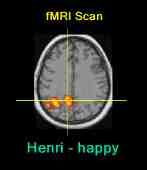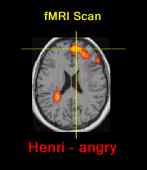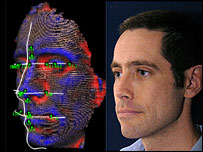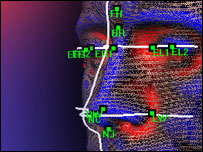2-3-2006 1:25PM
Mapping Veins as Human "Bar Code"
John Borland's article on CNET News.com describes how Luminetx, a small medical supply company in Memphis, Tennessee has developed a new technology that will allow the veins in your palm to act as a "fingerprint". Luminetx Chief Executive Officer, Jim Phillips, says that,
"In a way, it's like looking at a bar code. We convert your veins to a bar code."
John Borland of Cn
3-15-2005 1:25PM
New Technology In War On Terror Comes At High Price
Say Goodbye To Privacy
"British Firm Breaks Ground in Surveillance Science" is the title of an article by Mark Trevelyan on Yahoo News. The electromagnetic technology, known as Millimeter Wave (MMW), is the latest device to be used in the search for "suspicious persons". Privacy will be invaded even further with a device called "hyperspectral sensing" that will check for chemicals called pheromones, secreted by the human body, which may indicate agitation or stress.
"People under stress tend to exude slightly different pheromones, and you can pick this up ... There are sensing techniques we're working on."
Finally, cognitive software has been developed to surreptitiously track our movements. What kind of behaviors might alert such software you ask?
"Someone who's been back in and out of the same place three times or keeps bumping into the same people might be something that's worthy of further investigation ... I think that's really the sort of capabilities we're going to be looking at."
3-15-2005 1:15PM
Air Force Pursuing Antimatter Weapons
In this article from the San Francisco Chronicle, author Keay Davidson describes the Air Forces new weapons plans that were announced publicly before an official gag order was issued. From the article:
"In a sense, matter and antimatter are the yin and yang of reality: Every type of subatomic particle has its antimatter counterpart. But when matter and antimatter collide, they annihilate each other in an immense burst of energy."
"The real excitement, though, is this: If electrons or protons collide with their antimatter counterparts, they annihilate each other. In so doing, they unleash more energy than any other known energy source, even thermonuclear bombs. The energy from colliding positrons and antielectrons "is 10 billion times ... that of high explosive," Edwards explained in his March speech. Moreover, 1 gram of antimatter, about 1/25th of an ounce, would equal "23 space shuttle fuel tanks of energy." Thus "positron energy conversion," as he called it, would be a "revolutionary energy source" of interest to those who wage war.
It almost defies belief, the amount of explosive force available in a speck of antimatter -- even a speck that is too small to see. For example: One millionth of a gram of positrons contain as much energy as 37.8 kilograms (83 pounds) of TNT, according to Edwards' March speech. A simple calculation, then, shows that about 50-millionths of a gram could generate a blast equal to the explosion (roughly 4,000 pounds of TNT, according to the FBI) at the Alfred P. Murrah Federal Building in Oklahoma City in 1995."
11-29-2004
Feds Plan to Collect Information on all College Students
From the article US Eyes Collection of College-Student Data, on the Boston Globe Online:
"The federal government is considering the creation of a national database to collect information and track the progress of every college student in the country, triggering criticism from education and civil liberties advocates worried that it would amount to a loss of privacy for millions of Americans."
11-29-2004
fMRI Scanning: The Unbeatable Lie Detector
The article entitled, Lying Makes Brains Work Harder, found on Wired.com talks of a study where functional magnetic resonance imaging, or fMRI scan, was used in lie detection. Dr. Scott Faro said,
"There may be unique areas in the brain involved in truth telling,"
From the article:
"Using fMRI as a lie detector is expensive, but it may be worthwhile in some cases -- such as trying to question a terrorism suspect, or in a high-profile corporate crime case, Faro said."
Photos from www.brain-dynamics.net/ media/press/01_henri.php:
11-28-2004
RFID Tags to be Put on Passports
Vendors for Radio Frequency Identification (RFID) tags have been chosen in the US and Australia. This EETimes article says the potential chips could be read from 30 feet away. A proposed solution is to include a layer of metal foil into the cover of the passport so it can only be "scanned" when opened. I hope that's a joke.
Barry Steinhardt writes in this article on PrivacyInternational.org,
"The privacy issues raised by RFID tags are vitally important because they are representative of a larger trend in the United States: the seemingly inexorable drift toward a surveillance society. As Congress considers the privacy issues posed by RFID chips, I urge you to view them in the larger context – a world that is increasingly becoming a sea of data and databases, where the government and private corporations alike are gathering more and more details about our everyday existence."
Photo from www.cydome.de/berndreder/ archives/2004_01.html:
11-28-2004
3D Biometric Facial Recognition Beginning in UK
Roland Piquepaille writes at Primidi.com,
"... several police departments are now testing a 3D biometric facial recognition software from Aurora, a company based near Northampton. The use of facial recognition 'is rapidly becoming the third forensic science alongside fingerprints and DNA,' according to a police officer who talked to BBC News for 'How your face could open doors.'"
Photos are from the article How Your Face Could Open Doors on the BBC news online:
"1 Face-recognition camera can be sited at security position, such as protected entry point or cash machine
2 Camera performs four different functions, including 3D image recordings for authorization comparisons
3 A unique 3D mesh created from the subject's face holds the key to the biometric check"







